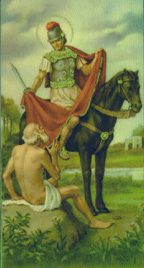Marin Mersenne
FREE Catholic Classes
French theologian, philosopher, and mathematician; b. 8 September, 1588, near Oizé (now Department of Sarthe); d. 1 September, 1648 at Paris. He studied at Le Mans and at the Jesuit College of La Flèche, where a lifelong friendship with Descartes, his fellow student, originated. Mersenne entered the novitiate of the Minims at Nigeon near Paris (1611), was sent to Nevers as professor of philosophy (1614-1620), and returned to Paris. His first publications were theological and polemical studies against Atheism and Scepticism, but later, Mersenne devoted his time almost exclusively to science, making personal experimental researches, and publishing a number of works on mathematical sciences. His chief merit, however, is rather the encouragement which he gave to scientists of his time, the interest he took in their work, and the stimulating influence of his suggestions and questions. Gassendi and Galileo were among his friends; but, above all, Mersenne is known today as Descartes's friend and adviser. In fact, when Descartes began to lead a free and dissipated life, it was Mersenne who brought him back to more serious pursuits and directed him toward philosophy. In Paris, Mersenne was Descartes's assiduous correspondent, auxiliary, and representative, as well as his constant defender. The numerous and vehement attacks against the "Meditations" seem, for a moment, to have aroused right -->Mersenne's suspicions; but Descartes's answers to his critics gave him full satisfaction as to his friend's orthodoxy and sincere Christian spirit. Mersenne asked that, after his death, an autopsy be made on his body, so as to serve to the last the interests of science.
Mersenne's works are: "Quæstiones celeberrimæ in Genesim" (Paris, 1623), against Atheists and Deists ; a part only has been published, the rest being still in manuscript, as also a "Commentary on St. Matthew's Gospel"; "L'impiété des déistes et des plus subtils libertins découverte et réfutée par raisons de théologie et de philosophie" (Paris, 1624); "La vérité des sciences contre les sceptiques et les pyrrhoniens" (Paris, 1625); "Questions theólogiques, physiques, morales et mathématiques" (Paris, 1634); "Questions inouïes, ou récréations des savants" (Paris, 1634); "Les mécaniques de Galilée" (Paris, 1634), a translation from the Italian; "Harmonie universelle, contenant la théorie et la pratique de la musique" (Paris, 1936-7); "Nouvelles découvertes de Galilée", and "Nouvelles pensées de Galilée sur les mécaniques" (Paris, 1639), both translations; "Cogitata physico-mathematica" (Paris, 1644); "Euclidis elementorum libri, Apollonii Pergæ conica, Sereni de sectione coni, etc." (Paris, 1626), selections and translations of ancient mathematicians, published again later with notes and additions under the title, "Universæ geometriæ mixtæque mathematicæ synopsis" (Paris, 1644).
Join the Movement
When you sign up below, you don't just join an email list - you're joining an entire movement for Free world class Catholic education.
-

-
Mysteries of the Rosary
-
St. Faustina Kowalska
-
Litany of the Blessed Virgin Mary
-
Saint of the Day for Wednesday, Oct 4th, 2023
-
Popular Saints
-
St. Francis of Assisi
-
Bible
-
Female / Women Saints
-
7 Morning Prayers you need to get your day started with God
-
Litany of the Blessed Virgin Mary
The Power of the Rosary: Why Praying the Rosary Matters for Catholics
-

Lasers Reveal Hidden Mayan City of Valeriana with 6,500 Structures in Mexico
-

Embracing Peace and Unity in a Time of Division
-
The 'Black Legend': Historian Argues Anti-Catholic Bias in Spanish Conquest Narratives
-
This Catholic Hero Who Fought Against Communism Should Be Released Immediately
Daily Catholic
 Daily Readings for Monday, November 11, 2024
Daily Readings for Monday, November 11, 2024 St. Martin of Tours: Saint of the Day for Monday, November 11, 2024
St. Martin of Tours: Saint of the Day for Monday, November 11, 2024 Prayer for Deceased Veterans: Prayer of the Day for Monday, November 11, 2024
Prayer for Deceased Veterans: Prayer of the Day for Monday, November 11, 2024- Daily Readings for Sunday, November 10, 2024
- St. Leo the Great: Saint of the Day for Sunday, November 10, 2024
- Evening Prayers: Prayer of the Day for Saturday, November 09, 2024
![]()
Copyright 2024 Catholic Online. All materials contained on this site, whether written, audible or visual are the exclusive property of Catholic Online and are protected under U.S. and International copyright laws, © Copyright 2024 Catholic Online. Any unauthorized use, without prior written consent of Catholic Online is strictly forbidden and prohibited.
Catholic Online is a Project of Your Catholic Voice Foundation, a Not-for-Profit Corporation. Your Catholic Voice Foundation has been granted a recognition of tax exemption under Section 501(c)(3) of the Internal Revenue Code. Federal Tax Identification Number: 81-0596847. Your gift is tax-deductible as allowed by law.






 Daily Readings for Monday, November 11, 2024
Daily Readings for Monday, November 11, 2024 St. Martin of Tours: Saint of the Day for Monday, November 11, 2024
St. Martin of Tours: Saint of the Day for Monday, November 11, 2024 Prayer for Deceased Veterans: Prayer of the Day for Monday, November 11, 2024
Prayer for Deceased Veterans: Prayer of the Day for Monday, November 11, 2024

